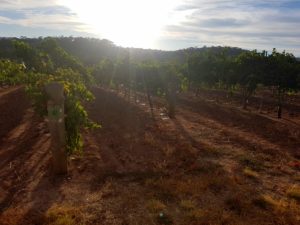
Harvest 2019 will go down in the record books as one of the most challenging on record. The skill of the viticulture and winemaking teams was really put to the test and thankfully led to another high-quality vintage.
Extremely low rainfall throughout winter and spring led to minimal subsoil moisture and virtually no run-off in dams for the beginning of the growing season. Following an already dry 2018 vintage period, underground water resources also didn’t have the ability to ‘re-charge’, meaning all three of our water resources were stretched to the limit. Canopies however remained healthy and strong, assisted with irrigation where possible heading into the warm summer months.
On the 1st December there was a localised hail storm that hit the northern parts of Clare, with hailstones the size of golf balls. Unfortunately, our Rogers vineyard bore the brunt of this storm, decimating 20% of the Shiraz crop.
Access to water and good irrigation management was critical to manage a number of extended heat periods, with maximum temperatures remaining above 35 degrees for 4 critical days in January and over a week in February. The end of February and into the start of March saw a period of 8 consecutive days over 35 degrees, when all Shiraz in the district reached flavour maturity at the same time.
Growers throughout the state saw yields decline rapidly before their eyes, and no level of irrigation could hold the fruit off any longer. Horror stories of reduction in yield to levels of 40-60% have been reported from a number of districts in the state. Fortunately, our average yield seems to be of the order of 75% on previous years so we are thankful for what we have.
Vineyard Manager Mick Plumridge said, “good water management had been a key factor once again. The 2018 rainfall level in Clare was down on our long-term average (550 millimetres), to 480 millimetres, and we’ve had consecutive growing seasons that have been very dry, the last 12 months delivering only 413 millimetres. However, we have been careful about putting the water on at the right time, so we maintained appropriate crop levels and kept the canopies fresh and healthy for as long as we could, which has provided us with good quality fruit at picking”.
Winemaker Brett Schutz said, “we are really pleased with preliminary looks at our reds, showing great depth of colour, firm tannins and forward fruit flavour. Riesling, one of the more resilient varieties is showing promise of being quite exceptional, and Pinot Gris flavours are extremely concentrated and vibrant due to the dry conditions. At this early stage we believe that the reds will have excellent cellaring potential and the whites should age well too”.
In summary, the vintage although challenging was trouble free and the quality looks excellent.
